This Page: Bone Resorption Activity Assay Kit, Fluorescence Detection
Features
Citation Chart
Assay Principle and Expected Results
Assay Precautions
Ordering
Foundational References
Citations
Bone Resorption Assay Flyer
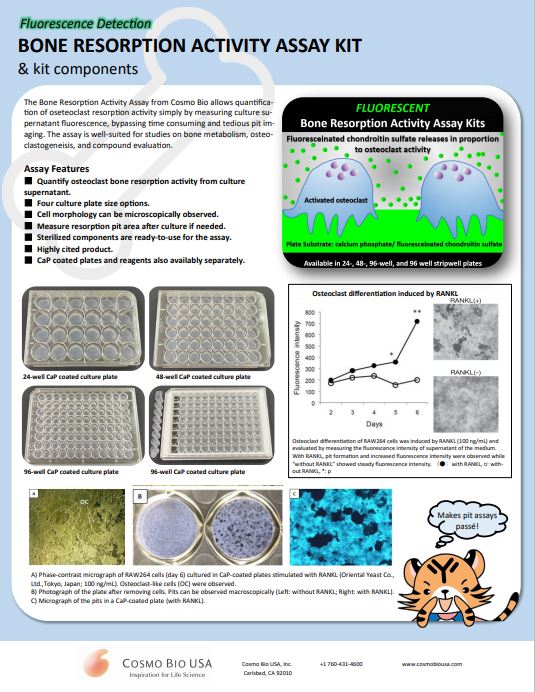
PDF Download
Cosmo Bio sells the complete line of Density Gradient Media Products from Serumwwerk including Polymorphprep™, Lymphoprep™, Nycodenz® and Optiprep™.
Here's why pit assays are passé.
Bone Resorption Activity Assay Kit, Fluorescence Detection
|
Cosmo Bio's Bone Resorption Activity Assay Kit is a multiwell solution for culture, differentiation and quantitative evaluation of bone resorption activity of osteoclasts. The assay reports the fluorescence signal arising from the accumulation of fluoresceinamine-labeled chondroitin sulfate released from plate-bound calcium phosphate (carbonate apatite) into culture well media. Bone Resorption Assay Kit leverages fluoresceinated calcium phosphate (CaP) as a substrate for cellular bone resorption activity. Culture plates (included in kits and also sold separately) are CaP pre-coated with a synthetic crystalline carbonate apatite, a uniform and defined alternative to natural apatite found in dentin discs. Prior to use, CaP-coated plates are freshly bound to fluoresceinamine-labeled chondroitin sulfate (included in kits and also sold separately). Osteoclastic resorption activity causes labeled chondroitin sulfate to be released from plate-bound calcium phosphate. Released labeled chondroitin sulfate is quantitated by simple fluorometric evaluation of fluorescence intensity. This kit also permits parallel performance of the slower, more labor intensive, but traditional pit assay. It should be noted that CosmoBio CaP-pre-coated plates have been used with trans-well inserts in cellular co-culture experimental designs (Heo, S. C. et al. Int J Mol Sci 22, 695 (2021) and Steller, D., Scheibert, A., Sturmheit, T. & Hakim, S. G. Sci Rep-uk 10, 16861 (2020)). |
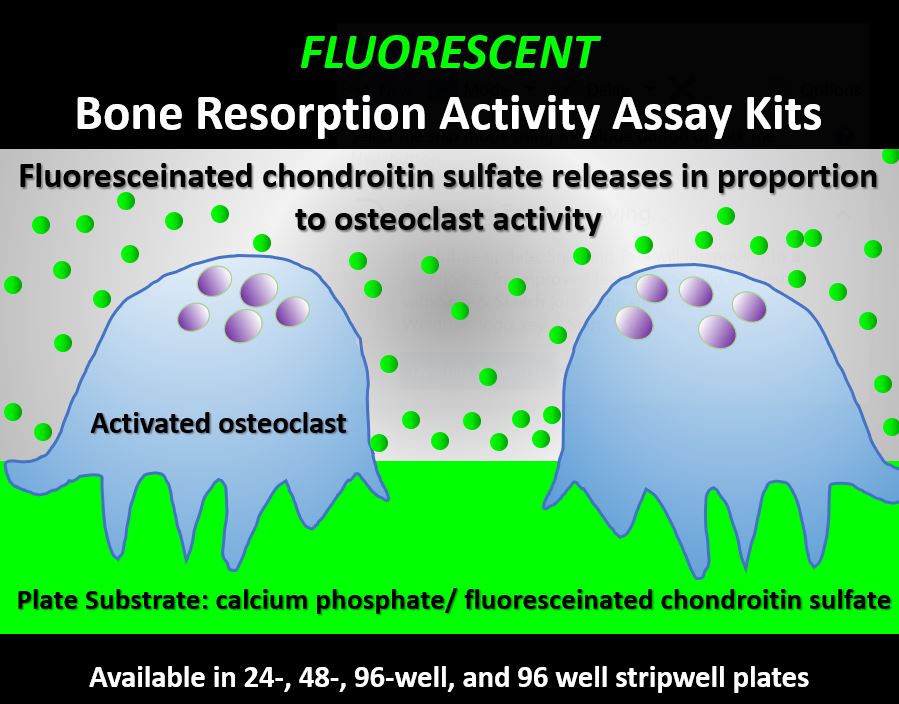 |
Features
- Time course of bone resorption activity easily obtained by measuring fluorescence of culture medium sample.
- Well-established method utilized by researchers worldwide. Imaging not required.
- Convenient CaP (hydroxyapatite) pre-coated wells; will not move within well.
- Ready to use sterile components.
- Fluorescence excitation and emission wavelengths identical to FITC. NOTE: use culture media lacking Phenol Red.
- Permits microscopic observation of cell morphology.
- Permits pit area assay after cell removal * using image analysis software.
- Suitable for evaluating osteoclast response to drugs such as bisphosphonates.
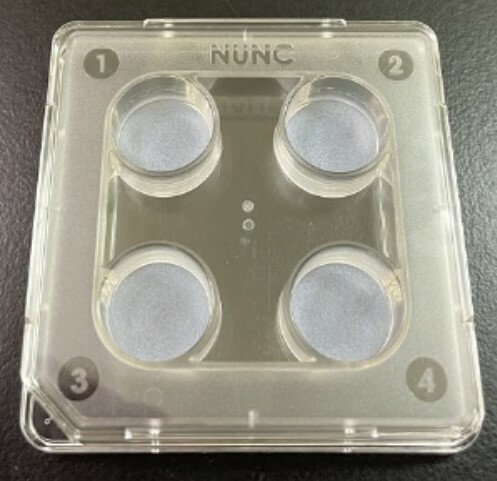 |
 |
| 4-well Plate | 24-well Plate |
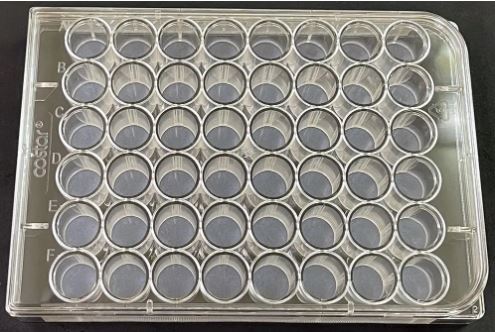 |
 |
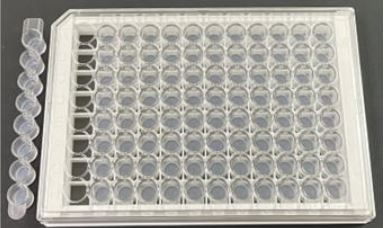 |
| 48-well Plate | 96-well Plate | 96-well stripwell Plate |
| Citation Chart |  |
| Since its commercial release Bone Resorption Assay Kit has steadily garnered over 117 Citations, including 10 halfway into 2021. Thus, CosmoBio’s Bone Resorption Assay Kit is a well-established and trusted commercial solution counted on by researchers studying bone metabolism. |
Assay Principle and Expected Results
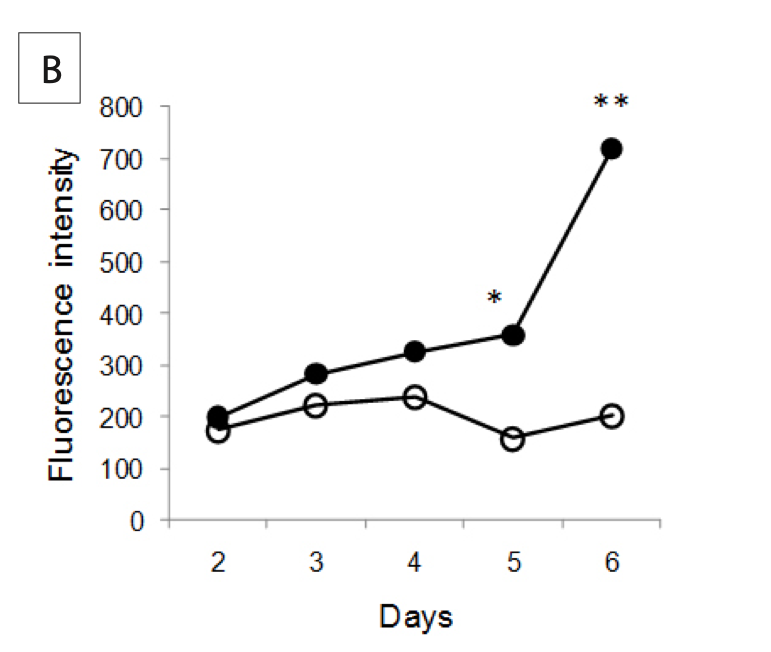 |
|
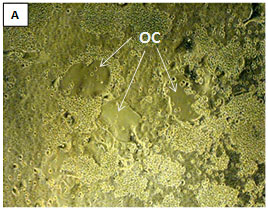 |
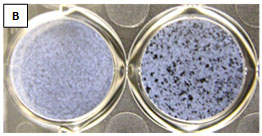 |
| Phase-contrast micrograph of RAW264 cells cultured with RANKL (100 ng/mL) for 6 days on CaP-coated plates. OC indicates where osteoclast-like cells were observed. | Photograph of a plate after removing cells. Pits can be observed macroscopically (Left, without RANKL; Right, with RANKL). |
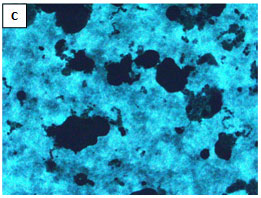 |
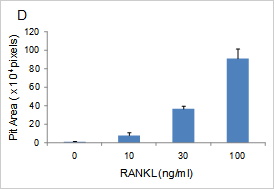 |
| Micrograph of pits formed in a CaP-coated plate (with RANKL). |
RANKL-dependent increase in pit area (mean ± S.D., n = 3). |
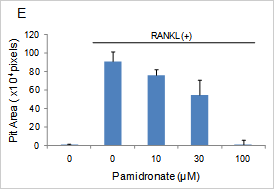 |
|
| Inhibitory effect of bisphosphonate Pamidronate on CaP resorption induced by RANKL (100 ng/mL). | |
Related Products:
Cosmo Bio sells the complete line of Density Gradient Media Products from Serumwwerk including Polymorphprep™, Lymphoprep™, Nycodenz® and Optiprep™.
Assay Precautions
- Use media free of phenol red to reduce background fluorescence.
- Osteoclastic differentiation activity varies with cell type and culture conditions. Culture media containing HEPES are known to modulate differentiation activity. Prior to using this kit, we recommend using conventional tissue culture plates to confirm the ability of your chosen culture media to effectively promote cellular differentiation.
- Protect plates from strong light.
- To stimulate cells, we recommend a RANKL concentration of ≥ 100 ng/mL.
- Because RANKL stimulation can impair cellular attachment, use caution during media changes.
- Because fluorescence intensity varies with pH and is lower under acidic conditions, we recommend the use of “Bone Resorption Assay Buffer” (CSR-BRA-B1) when measuring fluorescence intensity.
- Osteoclastic differentiation is reduced by fluoresceinamine-labeled chondroitin sulfate. However, this reduction was insufficient to impact the evaluation of a panel of bisphosphonate drugs. Nevertheless, caution should be exercised when evaluating drugs known to interact with chondroitin sulfate due to potential influence on bone resorption activity measurement.
- High concentrations (≥ 100μM) of certain bisphosphonates causes the release of FACS from the CaP layer.
- This product is for research use only and not for diagnostic or therapeutic procedures.
Ordering Info: Bone Resorption Assay Kits and Kit Components

Bone Resorption Assay KIT (Plate + FACS + Buffer)
| Catalog Number | Product | Size | Storage |
| CSR-BRA-4P | Bone Resorption Assay Kit 4 Kit Contents:
|
1 Kit | below 4°C |
| CSR-BRA-24KIT | Bone Resorption Assay Kit 24 Kit Contents:
|
1 Kit | below 4°C |
| CSR-BRA-48KIT | Bone Resorption Assay Kit 48 Kit Contents:
|
1 Kit | below 4°C |
| CSR-BRA-48X2KIT | Bone Resorption Assay Kit 48x2 Kit Contents:
|
1 Kit | below 4°C |
| CSR-BRA-96KIT | Bone Resorption Assay Kit 96 Kit Contents:
|
1 Kit | below 4°C |
| CSR-BRA-96X2KIT | Bone Resorption Assay Kit 96x2 Kit Contents:
|
2 Kits | below 4°C |
| CSR-BRA-S96KIT | Bone Resorption Assay Kit 96 stripwell Kit Contents:
|
1 Kit | below 4°C |
| CSR-BRA-S96X2KIT | Bone Resorption Assay Kit 96 stripwell x2 Kit Contents:
|
2 Kits | below 4°C |
Bone Resorption Assay Plates
| Catalog Number | Product | Size | Storage |
| CSR-BRA-24P | Bone Resorption Assay Plate 24
|
1 Plate | room temp, dark, sterile |
| CSR-BRA-48P | Bone Resorption Assay Plate 48
|
1 Plate | room temp, dark, sterile |
| CSR-BRA-48X2P | Bone Resorption Assay Plate 48 x 2
|
2 x 1 Plate | room temp, dark, sterile |
| CSR-BRA-96P | Bone Resorption Assay Plate 96
|
1 Plate | room temp, dark, sterile |
| CSR-BRA-96X2P | Bone Resorption Assay Plate 96 x 2
|
2 x 1 Plate | room temp, dark, sterile |
| CSR-BRA-S96P | Bone Resorption Assay Plate 96 stripwell
|
1 Plate | room temp, dark, sterile |
| CSR-BRA-S96X2P |
Bone Resorption Assay Plate 96 stripwell x 2
|
2 x 1 Plate | room temp, dark, sterile |
FACS and Buffer
| Catalog Number | Product | Size | Storage |
| CSR-BRA-FACS1 | Bone Resorption Assay FACS
|
13 ml | below 4°C, dark, sterile |
| CSR-BRA-B1 | Bone Resorption Assay Buffer
|
10 ml | below 4°C, dark, sterile |
Foundational References
- Miyazaki, T. and Suzuki, O. Using Fluorescent Polyanions to Assay for Osteoclastic Calcium-Resorption Activity in Calcium: Chemistry, Analysis, Function and Effects (ed. Preedy, V. R.) vol. 10 111–125 (The Royal Society of Chemistry, 2016).
- Miyazaki, T., Miyauchi, S., Anada, T., Imaizumi, H. and Suzuki, O. Evaluation of osteoclastic resorption activity using calcium phosphate coating combined with labeled polyanion Anal Biochem 410, 7–12 (2011).
- Miyazaki, T., Miyauchi, S., Tawada, A., Anada, T. and Suzuki, O. Effect of chondroitin sulfate-E on the osteoclastic differentiation of RAW264 cells Dent Mater J 29, 403–410 (2010).
Citations
2023
- Jang, Hye-Yeon, et al. "Protaetia brevitarsis Extract Attenuates RANKL-Induced Osteoclastogenesis by Inhibiting the JNK/NF-κB/PLCγ2 Signaling Pathway." Nutrients 15.14 (2023): 3193.
- Urabe, Fumihiko, et al. "Metastatic prostate cancer‐derived extracellular vesicles facilitate osteoclastogenesis by transferring the CDCP1 protein." Journal of Extracellular Vesicles 12.3 (2023): 12312.
- Min, Hong Ki, et al. "Dasatinib, a selective tyrosine kinase inhibitor, prevents joint destruction in rheumatoid arthritis animal model." International Journal of Rheumatic Diseases 26.4 (2023): 718-726.
- Rabjohns, Emily M., et al. "Aged G Protein-Coupled Receptor Kinase 3 (Grk3)-Deficient Mice Exhibit Enhanced Osteoclastogenesis and Develop Bone Lesions Analogous to Human Paget’s Disease of Bone." Cells 12.7 (2023): 981.
- Kim, Seong-Kyu, et al. "Histone Deacetylase 6 Inhibitor CKD-WID Suppressed Monosodium Urate-Induced Osteoclast Formation by Blocking Calcineurin-NFAT Pathway in RAW 264.7 Cells." Pharmaceuticals 16.3 (2023): 446.
- Ding, Mina, et al. "Crucial Role of Lysine-Specific Histone Demethylase 1 in RANKL-Mediated Osteoclast Differentiation." International Journal of Molecular Sciences 24.4 (2023): 3605.
- Whitlock, Jarred M., et al. "Cell surface-bound La protein regulates the cell fusion stage of osteoclastogenesis." Nature Communications 14.1 (2023): 616.
- Chen, Qi, et al. "Aberrant activation of TGF-β1 induces high bone turnover via Rho GTPases-mediated cytoskeletal remodeling in Camurati-Engelmann disease." Bone cell differentiation in health and disease 16648714 (2023).
- Whitlock, Jarred M., et al. "An inducible explant model of osteoclast-osteoprogenitor coordination in exacerbated osteoclastogenesis." Iscience 26.4 (2023).
2022
- XD Su, et al.
Aster saponin A2 inhibits osteoclastogenesis through mitogen-activated protein kinase-c-Fos-NFATc1 signaling pathway J Vet Sci. 2022 Jul; 23(4): e47. - HK Min, et al.
DJ-1 controls T cell differentiation and osteoclastogenesis in rheumatoid arthritisScientific Reports volume 12, Article number: 12767 (2022) - C Tortora, et al.
Effects of CB2 and TRPV1 Stimulation on Osteoclast Overactivity Induced by Iron in Pediatric Inflammatory Bowel Disease Inflammatory Bowel Diseases, Volume 28, Issue 8, August 2022, Pages 1244–1253, https://doi.org/10.1093/ibd/izac073 - F Rossi, et al.
Alteration of ost0eoclast activity in childhood cancer survivors: Role of iron and of CB2/TRPV1 receptors PLUS ONE July 21, 2022 https://doi.org/10.1371/journal.pone.0271730 - E Cho, et al.
Identification of Novel Genes for Cell Fusion during Osteoclast Formation Int. J. Mol. Sci. 2022, 23(12), 6421; https://doi.org/10.3390/ijms23126421 - JM Whitlock, et al.
An inducible explant model for dissecting osteoclast-osteoblast coordination in health and disease. Jarred M. Whitlock, Luis F. de Castro, Michael T. Collins, Leonid V. Chernomordik, Alison M. Boyce doi: https://doi.org/10.1101/2022.10.27.514052 - J Behera, et al.
Exercise-linked skeletal irisin ameliorates diabetes-associated osteoporosis by inhibiting the oxidative damage–dependent miR-150-FNDC5/pyroptosis axis Diabetes 2022;71(12):2777–2792 https://doi.org/10.2337/db21-0573 - ON Austah, et al.
Trigeminal neurons control immune-bone cell interaction and metabolism in apical periodontitis Cellular and Molecular Life Sciences volume 79, Article number: 330 (2022) - SH Mun, et al.
THOC5 regulates human osteoclastogenesis Volume 101, Issue 3, June–August 2022, 151248 https://doi.org/10.1016/j.ejcb.2022.151248 - Q Chen, et al.
Aberrant activation of TGF-β1 induces high bone turnover via Rho GTPases-mediated cytoskeletal remodeling in Camurati-Engelmann disease Front Endocrinol (Lausanne). 2022 Oct 17;13:913979. doi: 10.3389/fendo.2022.913979. eCollection 2022. - H Okawa, et al.
Fluorescent risedronate analogue 800CW-pRIS improves tooth extraction-associated abnormal wound healing in zoledronate-treated mice Communications Medicine volume 2, Article number: 112 (2022)
- Zang, L. et al. 10-Gingerol Suppresses Osteoclastogenesis in RAW264.7 Cells and Zebrafish Osteoporotic Scales Frontiers Cell Dev Biology 9, 588093 (2021).
- Chen, Z. et al. 2-NPPA Mitigates Osteoclastogenesis via Reducing TRAF6-Mediated c-fos Expression Front Pharmacol 11, 599081 (2021).<
- Watahiki, A. et al. Deficiency of Lipin2 Results in Enhanced NF-κB Signaling and Osteoclast Formation in RAW-D Murine Macrophages Int J Mol Sci 22, 2893 (2021).
- Tamura, H. et al. Effects of Erythromycin on Osteoclasts and Bone Resorption via DEL-1 Induction in Mice Antibiotics10, 312 (2021).
- Heo, S. C. et al. Elevated Expression of Cathepsin K in Periodontal Ligament Fibroblast by Inflammatory Cytokines Accelerates Osteoclastogenesis via Paracrine Mechanism in Periodontal Disease Int J Mol Sci 22, 695 (2021).
- Ha, Y.-J. et al. Fucoxanthin Suppresses Osteoclastogenesis via Modulation of MAP Kinase and Nrf2 Signaling Mar Drugs 19, 132 (2021).
- Lee, E.-J. et al. Hydroxycoumarin Scopoletin Inhibits Bone Loss through Enhancing Induction of Bone Turnover Markers in a Mouse Model of Type 2 Diabetes Biomed 9, 648 (2021).
- Chen, Z. et al. N‐[2‐(4‐benzoyl‐1‐piperazinyl)phenyl]‐2‐(4‐chlorophenoxy) acetamide is a novel inhibitor of resorptive bone loss in mice J Cell Mol Med 25, 1425–1438 (2021).
- Lee, J. et al. PDK2 Deficiency Prevents Ovariectomy‐Induced Bone Loss in Mice by Regulating the RANKL‐NFATc1 Pathway During Osteoclastogenesis J Bone Miner Res 36, 553–566 (2021).
- Nakane, S., Imamura, K., Hisanaga, R., Ishihara, K. & Saito, A. Systemic administration of cytotoxic T lymphocyte‐associated antigen 4 (CTLA‐4)‐Ig abrogates alveolar bone resorption in induced periodontitis through inhibition of osteoclast differentiation and activation: An experimental investigation J Periodontal Res (2021) doi:10.1111/jre.12909.
-
D Young, et al.
Development of a Cause-based Treatment for NBP-induced MRONJ Journal of Oral and Maxillofacial Surgery Volume 79, Issue 10, Supplement, October 2021, Pages e51-e52 -
HA Hairi, et al.
Demethylbelamcandaquinone B from Marantodes pumilum var. alata (Blume) Kuntze inhibits osteoclast differentiation in RAW264. 7 cells Asian Pacific Journal of Tropical Biomedicine Year : 2021 | Volume : 11 | Issue : 12 | Page : 535-542 DOI: 10.4103/2221-1691.331269 -
M Paoletta, et al.
Role of the Endocannabinoid/Endovanilloid System in the Modulation of Osteoclast Activity in Paget's Disease of Bone Int. J. Mol. Sci. 2021, 22(18), 10158; https://doi.org/10.3390/ijms221810158 -
W Xiao et al.
LOXG473A induces the formation of osteoclasts in RAW264. 7 cells via IL-6/JAK2/STAT3 signaling Experimental Cell Research Volume 409, Issue 1, 1 December 2021, 112890 -
YF Kao, et al.
Suppressive effects of an apoptotic mimicry prepared from jumbo-flying squid-skin phospholipids on the osteoclastogenesis in receptor activator of nuclear …Journal of the Chinese Medical Association 84(1):p 51-60, January 2021. | DOI: 10.1097/JCMA.0000000000000447 -
L Li, et al.
Kalkitoxin reduces osteoclast formation and resorption and protects against inflammatory bone loss Int. J. Mol. Sci. 2021, 22(5), 2303; https://doi.org/10.3390/ijms22052303 -
HY Jang, et al.
Aqueous extract of Chrysanthemum morifolium Ramat. inhibits RANKL-induced osteoclast differentiation by suppressing the c-fos/NFATc1 pathway Archives of Oral Biology Volume 122, February 2021, 105029 -
F Bhuyan, et al.
Novel Majeed Syndrome–Causing LPIN2 Mutations Link Bone Inflammation to Inflammatory M2 Macrophages and Accelerated Osteoclastogenesis Arthritis & Rheumatology Volume 73, Issue 6 p. 1021-1032 https://doi.org/10.1002/art.41624
2020
- Na, W. et al. Aesculetin Inhibits Osteoclastic Bone Resorption through Blocking Ruffled Border Formation and Lysosomal Trafficking Int J Mol Sci 21, 8581 (2020).
- Wada, S. et al. Bach1 Inhibition Suppresses Osteoclastogenesis via Reduction of the Signaling via Reactive Oxygen Species by Reinforced Antioxidation Frontiers Cell Dev Biology 8, 740 (2020).
- Zhou, Y. et al. BMP9 Reduces Bone Loss in Ovariectomized Mice by Dual Regulation of Bone Remodeling J Bone Miner Res 35, 978–993 (2020).
- Lee, E.-J. et al. Coumarin Ameliorates Impaired Bone Turnover by Inhibiting the Formation of Advanced Glycation End Products in Diabetic Osteoblasts and Osteoclasts Biomol 10, 1052 (2020).
- Nishioku, T. et al. Dimethyl fumarate prevents osteoclastogenesis by decreasing NFATc1 expression, inhibiting of erk and p38 MAPK phosphorylation, and suppressing of HMGB1 release Biochem Bioph Res Co 530, 455–461 (2020).<
- Shang, N. & Wu, J. Egg-Derived Tripeptide IRW Attenuates LPS-Induced Osteoclastogenesis in RAW 264.7 Macrophages via Inhibition of Inflammatory Responses and NF-κB/MAPK Activation J Agr Food Chem 68, 6132–6141 (2020).
- Steller, D., Scheibert, A., Sturmheit, T. & Hakim, S. G. Establishment and validation of an in vitro co-culture model for oral cell lines using human PBMC-derived osteoclasts, osteoblasts, fibroblasts and keratinocytes Sci Rep-uk 10, 16861 (2020).
- Kumagai, M. et al. Fluorinated Kavalactone Inhibited RANKL-Induced Osteoclast Differentiation of RAW264 Cells Biological Pharm Bulletin 43, 898–903 (2020).
- Choi, Y. et al. Gastrin-Releasing Peptide (GRP) Stimulates Osteoclastogenesis in Periodontitis Cells 10, 50 (2020).
- Korea, D. of O. M. and I., Wonkwang University College of Dentistry, Iksan 54538, Republic of, Park, G. H., Gu, D. R. & Lee, S. H. Inhibitory effect of Chaenomelis Fructus ethanol extract on receptor activator of nuclear factor-kappa B ligand-mediated osteoclastogenesis Int J Oral Biology 45, 15–24 (2020).
- Park, K. H., Gu, D. R., Kim, M. S. & Lee, S. H. Inhibitory Effect of Rosae Multiflorae Fructus Extracts on the Receptor Activator of NF-κB Ligand-Induced Osteoclastogenesis through Modulation of P38- and Ca2+-Mediated Nuclear Factor of Activated T-Cells Cytoplasmic 1 Expression J Bone Metabolism 27, 53–63 (2020).
- Jeong, S. et al. Isoliquiritigenin Derivatives Inhibit RANKL-Induced Osteoclastogenesis by Regulating p38 and NF-κB Activation in RAW 264.7 Cells Molecules 25, 3908 (2020).
- Kim, S.-I. et al. Linarin and its aglycone acacetin abrogate actin ring formation and focal contact to bone matrix of bone-resorbing osteoclasts through inhibition of αvβ3 integrin and core-linked CD44 Phytomedicine 79, 153351 (2020).
- Lee, J. et al. N-[2-(4-Acetyl-1-Piperazinyl)Phenyl]-2-(3-Methylphenoxy)Acetamide (NAPMA) Inhibits Osteoclast Differentiation and Protects against Ovariectomy-Induced Osteoporosis Molecules 25, 4855 (2020).
- Matsubara, T. et al. Plectin stabilizes microtubules during osteoclastic bone resorption by acting as a scaffold for Src and Pyk2 Bone 132, 115209 (2020).
- Cho, E. et al. PMSA prevents osteoclastogenesis and estrogen-dependent bone loss in mice Bone 142, 115707 (2020).
- Kao, Y.-F., Tu, M.-C., Chai, H.-J., Lin, Y.-L. & Chen, Y.-C. Suppressive effects of an apoptotic mimicry prepared from jumbo-flying squid-skin phospholipids on the osteoclastogenesis in receptor activator of nuclear factor kappa B ligand/macrophage colony-stimulating factor-induced RAW 264.7 cells J Chin Med Assoc 84, 51–60 (2020).
- Tortora et al. The Role of Cannabinoid Receptor Type 2 in the Bone Loss Associated With Pediatric Celiac Disease Journal of Pediatric Gastroenterology and Nutrition 71, 633–640 (2020).
- Yeh, I.-J. et al. 6-Shogaol Suppresses 2-Amino-1-Methyl-6-Phenylimidazo [4,5-b] Pyridine (PhIP)-Induced Human 786-O Renal Cell Carcinoma Osteoclastogenic Activity and Metastatic Potential Nutrients 11, 2306 (2019).
- Li, J. et al. Artemisinin inhibits breast cancer‐induced osteolysis by inhibiting osteoclast formation and breast cancer cell proliferation J Cell Physiol 234, 12663–12675 (2019).
- Kim, H. Y. et al. Auranofin Inhibits RANKL-Induced Osteoclastogenesis by Suppressing Inhibitors of κB Kinase and Inflammasome-Mediated Interleukin-1β Secretion Oxid Med Cell Longev 2019, 1–12 (2019).
- Matsuike, R. et al. Continuous Compressive Force Induces Differentiation of Osteoclasts with High Levels of Inorganic Dissolution Med Sci Monitor 25, 3902–3909 (2019).
- Angireddy, R. et al. Cytochrome c oxidase dysfunction enhances phagocytic function and osteoclast formation in macrophages Faseb J 33, 9167–9181 (2019).
- Kim, S., Kang, S.-S., Choi, S.-I., Kim, G.-H. & Imm, J.-Y. Ecklonia cava Extract Containing Dieckol Suppresses RANKL-Induced Osteoclastogenesis via MAP Kinase/NF-kappa B Pathway Inhibition and Heme Oxygenase-1 Induction J Microbiol Biotechn 29, 11–20 (2019).
- Li, J. et al. eIF2α signaling regulates autophagy of osteoblasts and the development of osteoclasts in OVX mice Cell Death Dis 10, 921 (2019).
- Chen, Z., Cho, E., Lee, J., Lee, S. & Lee, T.-H. Inhibitory Effects of N-[2-(4-acetyl-1-piperazinyl) phenyl]-2-(2-chlorophenoxy) acetamide on Osteoclast Differentiation In Vitro via the Downregulation of TRAF6 Int J Mol Sci 20, 5196 (2019).
- Kasagi, S. et al. MicroRNA-124 inhibits TNF-α- and IL-6-induced osteoclastogenesis Rheumatology International39, 689–695 (2019).
- Nishiguchi, A. & Taguchi, T. Osteoclast-Responsive, Injectable Bone of Bisphosphonated-Nanocellulose that Regulates Osteoclast/Osteoblast Activity for Bone Regeneration Biomacromolecules 20, 1385–1393 (2019).
- Ma, Y. et al. Osthole inhibits osteoclasts formation and bone resorption by regulating NF‐κB signaling and NFATc1 activations stimulated by RANKL J Cell Biochem 120, 16052–16061 (2019).
- Lee, K.-A. et al. Promotion of osteoclastogenesis by IL-26 in rheumatoid arthritis Arthritis Res Ther 21, 283 (2019).
- Cho, E., Chen, Z., Lee, J., Lee, S. & Lee, T.-H. PSTP-3,5-Me Inhibits Osteoclast Differentiation and Bone Resorption Molecules 24, 3346 (2019).
- Hsu, L.-C., Reddy, S. V., Yilmaz, Ö. & Yu, H. Sphingosine-1-Phosphate Receptor 2 Controls Podosome Components Induced by RANKL Affecting Osteoclastogenesis and Bone Resorption Cells 8, 17 (2019).
- Abdallah, B. M. et al. The Coumarin Derivative 5′-Hydroxy Auraptene Suppresses Osteoclast Differentiation via Inhibiting MAPK and c-Fos/NFATc1 Pathways Biomed Res Int 2019, 1–10 (2019).
- Jin, S. H. et al. Actin-binding LIM protein 1 regulates receptor activator of NF-κB ligand-mediated osteoclast differentiation and motility Bmb Rep 51, 356–361 (2018).
- Kwon, Y.-B., Wang, F.-F. & Jang, H.-D. Anti-osteoclastic effect of caffeic acid phenethyl ester in murine macrophages depends upon the suppression of superoxide anion production through the prevention of an active-Nox1 complex formation J Nutritional Biochem 58, 158–168 (2018).
- Kittaka, M. et al. Cherubism Mice Also Deficient in c‐Fos Exhibit Inflammatory Bone Destruction Executed by Macrophages That Express MMP14 Despite the Absence of TRAP+ Osteoclasts J Bone Miner Res 33, 167–181 (2018).
- Na, S. et al. Dose analysis of photobiomodulation therapy on osteoblast, osteoclast, and osteocyte J Biomed Opt 23, 075008 (2018).<>
- Ahn, S.-H. et al. Inhibitory Effects of 2N1HIA (2-(3-(2-Fluoro-4-Methoxyphenyl)-6-Oxo-1(6H)-Pyridazinyl)-N-1H-Indol-5-Ylacetamide) on Osteoclast Differentiation via Suppressing Cathepsin K Expression Molecules 23, 3139 (2018).
- Wijekoon, H. M. S. et al. Inhibitory effects of sodium pentosan polysulfate on formation and function of osteoclasts derived from canine bone marrow Bmc Vet Res 14, 152 (2018).
- Wik, H. M. S. Pentosan Polysulfate: an Effective Treatment for Model of Rheumatoid Arthritis and a Novel Candidate for Inhibition of Cytokines-Induced Osteoclastogenesis (2018).
- Chu, G., Zhang, W., Chen, M., Yang, H. & Yuan, Z. Punicalagin inhibits RANKL-induced osteoclastogenesis by suppressing NF-KB and MAPK signaling pathways Int J Clin Exp Med 11, 6571–6582 (2018).
- Lin, B., Ke, Q., Leaman, D. W., Goel, V. & Agarwal, A. Regulation of RANKL‐induced osteoclastogenesis by RING finger protein RNF114 J Orthopaed Res 36, 159–166 (2018).
- Funaki, Y. et al. Resolvin E1 Inhibits Osteoclastogenesis and Bone Resorption by Suppressing IL-17-induced RANKL Expression in Osteoblasts and RANKL-induced Osteoclast Differentiation Yonago Acta Med 61, 008–018 (2018).
- Nishida, M., Saegusa, J., Tanaka, S. & Morinobu, A. S100A12 facilitates osteoclast differentiation from human monocytes Plos One 13, e0204140 (2018).
- Fessler, J. et al. Senescent T-Cells Promote Bone Loss in Rheumatoid Arthritis Front Immunol 9, 95 (2018).
- Sapkota, M., Li, L., Kim, S.-W. & Soh, Y. Thymol inhibits RANKL-induced osteoclastogenesis in RAW264.7 and BMM cells and LPS-induced bone loss in mice Food Chem Toxicol 120, 418–429 (2018).
- Lee, S.-H., Lee, J.-Y., Kwon, Y.-I. & Jang, H.-D. Anti-Osteoclastic Activity of Artemisia capillaris Thunb. Extract Depends upon Attenuation of Osteoclast Differentiation and Bone Resorption-Associated Acidification Due to Chlorogenic Acid, Hyperoside, and Scoparone Int J Mol Sci 18, 322 (2017).
- Wijekoon, S. et al. Chronological differential effects of pro-inflammatory cytokines on RANKL-induced osteoclast differentiation of canine bone marrow-derived macrophages J Vet Med Sci 17–0393 (2017) doi:10.1292/jvms.17-0393.
- Kim, H. et al. Comprehensive study on the roles of released ions from biodegradable Mg–5 wt% Ca–1 wt% Zn alloy in bone regeneration J Tissue Eng Regen M 11, 2710–2724 (2017).
- Cong, F. et al. Ginsenoside Rb2 inhibits osteoclast differentiation through nuclear factor-kappaB and signal transducer and activator of transcription protein 3 signaling pathway Biomed Pharmacother 92, 927–934 (2017).
- Maruyama, K. et al. Nociceptors Boost the Resolution of Fungal Osteoinflammation via the TRP Channel-CGRP-Jdp2 Axis Cell Reports 19, 2730–2742 (2017).
- Lee, D. et al. Nutrikinetics of Isoflavone Metabolites After Fermented Soybean Product (Cheonggukjang) Ingestion in Ovariectomized Mice Mol Nutr Food Res 61, 1700322 (2017).
- Bellini, G. et al. PKCβII-mediated cross-talk of TRPV1/CB2 modulates the glucocorticoid-induced osteoclast overactivity Pharmacol Res 115, 267–274 (2017).
- Park, K. H. et al. Pueraria lobate Inhibits RANKL-Mediated Osteoclastogenesis Via Downregulation of CREB/PGC1β/c-Fos/NFATc1 Signaling The American Journal of Chinese Medicine 45, (2017).
- Hirai, T. et al. The effectiveness of new triple combination therapy using synthetic disease-modifying anti-rheumatic drugs with different pharmacological function against rheumatoid arthritis: the verification by an in vitro and clinical study Clin Rheumatol 36, 51–58 (2017).
- Gu, D. R. et al. The inhibitory effect of beta-lapachone on RANKL-induced osteoclastogenesis Biochem Bioph Res Co 482, 1073–1079 (2017).
2016
- Nishioku, T., Terasawa, M., Baba, M., Yamauchi, A. & Kataoka, Y. CD147 promotes the formation of functional osteoclasts through NFATc1 signalling Biochem Bioph Res Co 473, 620–624 (2016).
- Antika, L. D. et al. Dietary compound gossypetin inhibits bone resorption through down-regulating lysosomal cathepsin K activity and autophagy-related protein induction in actin ring-bearing osteoclasts J Funct Food 24, 390–402 (2016).
- Qiu, Z.-C. et al. Discovery of a New Class of Cathepsin K Inhibitors in Rhizoma Drynariae as Potential Candidates for the Treatment of Osteoporosis Int J Mol Sci 17, 2116 (2016).
- Feres, M. F. N., Kucharski, C., Diar-Bakirly, S. & El-Bialy, T. Effect of low-intensity pulsed ultrasound on the activity of osteoclasts: An in vitro study Arch Oral Biol 70, 73–78 (2016).
- Li, L., Sapkota, M., Kim, S. & Soh, Y. Herbacetin inhibits RANKL-mediated osteoclastogenesis in vitro and prevents inflammatory bone loss in vivo Eur J Pharmacol 777, 17–25 (2016).
- Shiota, J., Murao, H., Miura, A., Mikami, M. & Tanaka, K. Iguratimod, a Disease-Modifying Anti-Rheumatic Drug, Inhibits Osteoclastogenesis and Bone Resorption through Suppression of the Nuclear Factor of Activated T Cells Signaling Pathway Open J Rheumatology Autoimmune Dis 06, 106–119 (2016).
- Ishikawa, S. et al. Inductive Effect of Palmatine on Apoptosis in RAW 264.7 Cells Evid-based Compl Alt 2016, 1–9 (2016).
- Joung, Y. H. et al. Methylsulfonylmethane Inhibits RANKL-Induced Osteoclastogenesis in BMMs by Suppressing NF-κB and STAT3 Activities Plos One 11, e0159891 (2016).
- Cheng, T.-L. et al. Myeloid thrombomodulin lectin-like domain inhibits osteoclastogenesis and inflammatory bone loss Sci Rep-uk 6, 28340 (2016).
- Pengjam, Y. et al. NF-κB pathway inhibition by anthrocyclic glycoside aloin is key event in preventing osteoclastogenesis in RAW264.7 cells Phytomedicine 23, 417–428 (2016).
- Kaneki, K. et al. Palmatine’s Suppression on NFATc1 for RANKL‒treated RAW264.7 Cells Japanese Pharmacology & Therapeutics 44, 997–1004 (2016).
- Takigawa, S. et al. Role of miR-222-3p in c-Src-Mediated Regulation of Osteoclastogenesis Int J Mol Sci 17, 240 (2016).
- Yu, H. Sphingosine-1-Phosphate Receptor 2 Regulates Proinflammatory Cytokine Production and Osteoclastogenesis Plos One 11, e0156303 (2016).
- Maruyama, K. et al. 5-Azacytidine-induced Protein 2 (AZI2) Regulates Bone Mass by Fine-tuning Osteoclast Survival J Biol Chem 290, 9377–9386 (2015).
- Davis, J. W. E. O.-D. A. R., Olmsted-Davis, E., Davis, A. R. & Sevick-Muraca, E. An Injectable Method for Posterior Lateral Spine Fusion (2015).
- Sapkota, M., Li, L., Choi, H., Gerwick, W. H. & Soh, Y. Bromo-honaucin A inhibits osteoclastogenic differentiation in RAW 264.7 cells via Akt and ERK signaling pathways Eur J Pharmacol 769, 100–109 (2015).
- Miyazaki, T., Miyauchi, S., Anada, T., Tawada, A. & Suzuki, O. Chondroitin Sulfate‐E Binds to Both Osteoactivin and Integrin αVβ3 and Inhibits Osteoclast Differentiation J Cell Biochem 116, 2247–2257 (2015).
- Gohda, J. et al. HIV-1 replicates in human osteoclasts and enhances their differentiation in vitro Retrovirology 12, 12 (2015).
- Mishima, K. et al. Lansoprazole Upregulates Polyubiquitination of the TNF Receptor-Associated Factor 6 and Facilitates Runx2-mediated Osteoblastogenesis Ebiomedicine 2, 2046–2061 (2015).
- Park, S. et al. Osteonecrosis of the Jaw Developed in Mice: DISEASE VARIANTS REGULATED BY γδ T CELLS IN ORAL MUCOSAL BARRIER IMMUNITY J Biol Chem 290, 17349–17366 (2015).
- Kloos, B. et al. Pasteurella multocida toxin- induced osteoclastogenesis requires mTOR activation Cell Commun Signal 13, 40 (2015).
- Yamashita, Y. et al. RANKL pretreatment plays an important role in the differentiation of pit-forming osteoclasts induced by TNF-α on murine bone marrow macrophages Arch Oral Biol 60, 1273–1282 (2015).
- Kim, K.-W., Kim, B.-M., Moon, H.-W., Lee, S.-H. & Kim, H.-R. Role of C-reactive protein in osteoclastogenesis in rheumatoid arthritis Arthritis Res Ther 17, 41 (2015).
- Lee, S.-H. & Jang, H.-D. Scoparone attenuates RANKL-induced osteoclastic differentiation through controlling reactive oxygen species production and scavenging Exp Cell Res 331, 267–277 (2015).
- TSAI, Y.-M. et al. Syringetin suppresses osteoclastogenesis mediated by osteoblasts in human lung adenocarcinoma Oncol Rep 34, 617–626 (2015).
- Kim, K.-W., Kim, H.-R., Kim, B.-M., Cho, M.-L. & Lee, S.-H. Th17 Cytokines Regulate Osteoclastogenesis in Rheumatoid Arthritis Am J Pathology 185, 3011–3024 (2015).
- Hong, S. H. et al. The antibody atliximab attenuates collagen-induced arthritis by neutralizing AIMP1, an inflammatory cytokine that enhances osteoclastogenesis Biomaterials 44, 45–54 (2015).
- Choe, C.-H. et al. Transmembrane protein 173 inhibits RANKL‐induced osteoclast differentiation Febs Lett 589, 836–841 (2015).
- Hung, J.-Y. et al. Tricetin, a dietary flavonoid, suppresses benzo(a)pyrene-induced human non-small cell lung cancer bone metastasis Int J Oncol 46, 1985–1993 (2015).
- Eda, H. et al. A novel Bruton’s tyrosine kinase inhibitor CC-292 in combination with the proteasome inhibitor carfilzomib impacts the bone microenvironment in a multiple myeloma model with resultant antimyeloma activity Leukemia 28, 1892–1901 (2014).
- Ohba, T. et al. Bisphosphonates Inhibit Osteosarcoma‐Mediated Osteolysis Via Attenuation of Tumor Expression of MCP‐1 and RANKL J Bone Miner Res 29, 1431–1445 (2014).
- Nishida, H. et al. Blockade of CD26 Signaling Inhibits Human Osteoclast Development J Bone Miner Res 29, 2439–2455 (2014).
- Sharma, R. et al. Caspase-2 Maintains Bone Homeostasis by Inducing Apoptosis of Oxidatively-Damaged Osteoclasts Plos One 9, e93696 (2014).
- Kim, Y.-H. et al. Fisetin antagonizes cell fusion, cytoskeletal organization and bone resorption in RANKL-differentiated murine macrophages J Nutritional Biochem 25, 295–303 (2014).
- Kanzaki, H. et al. Nuclear Nrf2 Induction by Protein Transduction Attenuates Osteoclastogenesis Free Radical Bio Med 77, 239–248 (2014).
- Hsu, Y.-L. et al. Obtusifolin Suppresses Phthalate Esters-Induced Breast Cancer Bone Metastasis by Targeting Parathyroid Hormone-Related Protein J Agr Food Chem 62, 11933–11940 (2014).
- Kang, J. H. et al. Osteoprotegerin Expressed by Osteoclasts: An Autoregulator of Osteoclastogenesis J Dent Res 93, 1116–1123 (2014).
- Lee, C. W. et al. Potential anti-osteoporotic activity of low-molecular weight hyaluronan by attenuation of osteoclast cell differentiation and function in vitro Biochem Bioph Res Co 449, 438–443 (2014).
- Hokugo, A., Sun, S., Park, S., McKenna, C. E. & Nishimura, I. Equilibrium-dependent bisphosphonate interaction with crystalline bone mineral explains anti-resorptive pharmacokinetics and prevalence of osteonecrosis of the jaw in rats Bone 53, 59–68 (2013).
- Choi, Y. S. et al. Joint-protective effects of compound K, a major ginsenoside metabolite, in rheumatoid arthritis: in vitro evidence Rheumatol Int 33, 1981–1990 (2013).
- Kuo, C.-H. et al. Lung tumor-associated dendritic cell-derived resistin promoted cancer progression by increasing Wolf–Hirschhorn syndrome candidate 1/Twist pathway Carcinogenesis 34, 2600–2609 (2013).
- Orosa, B. et al. Lysophosphatidic acid receptor inhibition as a new multipronged treatment for rheumatoid arthritis Ann Rheum Dis 73, 298 (2013).
- Tanaka, H. et al. Nicotine Affects Bone Resorption and Suppresses the Expression of Cathepsin K, MMP-9 and Vacuolar-Type H+-ATPase d2 and Actin Organization in Osteoclasts Plos One 8, e59402 (2013).
- Harada, K. et al. Polyphosphate-Mediated Inhibition of Tartrate-Resistant Acid Phosphatase and Suppression of Bone Resorption of Osteoclasts Plos One 8, e78612 (2013).
- Moon, S.-J. et al. Temporal differential effects of proinflammatory cytokines on osteoclastogenesis Int J Mol Med31, 769–777 (2013).
- Rossi, F. et al. The 17-β-oestradiol inhibits osteoclast activity by increasing the cannabinoid CB2 receptor expression Pharmacol Res 68, 7–15 (2013).
- Kanzaki, H., Shinohara, F., Kajiya, M. & Kodama, T. The Keap1/Nrf2 Protein Axis Plays a Role in Osteoclast Differentiation by Regulating Intracellular Reactive Oxygen Species Signaling J Biol Chem 288, 23009–23020 (2013).
2012
- Fabre, C. et al. Dual Inhibition of Canonical and Noncanonical NF-κB Pathways Demonstrates Significant Antitumor Activities in Multiple Myeloma Am Assoc Cancer Res 18, 4669–4681 (2012).
- Kim, J. et al. Novel antiosteoclastogenic activity of phloretin antagonizing RANKL‐induced osteoclast differentiation of murine macrophages Mol Nutr Food Res 56, 1223–1233 (2012).
- Kim, J. et al. Osteoblastogenesis and osteoprotection enhanced by flavonolignan silibinin in osteoblasts and osteoclasts J Cell Biochem 113, 247–259 (2012).
- JL, K. et al. Osteogenic activity of yellow flag iris (Iris pseudacorus) extract modulating differentiation of osteoblasts and osteoclasts Am J Chin Med 40, 1289–305 (2012).
